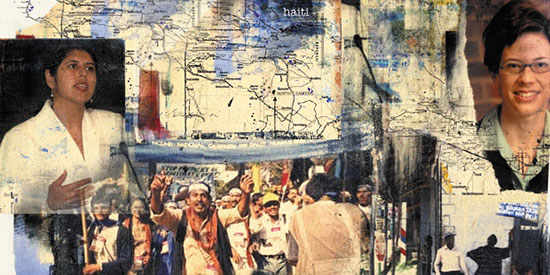From a base in Washington Square, students investigate global issues
To effectively advocate for their clients across time zones, cultures and languages, the International Environmental Law and International Human Rights Clinics marshal all available resources at the Law School, including the international body of LL.M. students and the Centers of Human Rights and Global Justice (CHRGJ) and Environmental and Land-Use Law (CELUL). The clinics’ successes have been stunning,especially considering the complex challenges they face.
The International Environmental Law Clinic selects an equal mix of J.D.s and LL.M.s who analyze the legal and policy issues presented by clients who include environmental groups, foreign governments, the U.N., the World Bank and other multinational organizations. Their output may include drafts of laws or policy proposals; research and preparation of position papers, and analysis of policy revisions or reforms. The students work closely with University Professor Richard Stewart, director of CELUL and the Hauser Global Law School Program.

Students in his clinic have worked for Environmental Defense in New York, researching the practice of using carbon credits to reduce deforestation in developing countries. The trading scheme, formalized in the Kyoto Protocol, encourages polluting companies to fund environmentally friendly practices such as tree planting in other countries. Another group of students assisted the Israel Union for Environmental Defense, a Tel Aviv-based public-interest group, in analyzing the environmental law and policy issues that arose in developing a cooperative program between Israelis and Palestinians to better manage shared water resources.
The International Human Rights Clinic has leveraged the contacts, scholarship and passions of Assistant Professors of Clinical Law Smita Narula and Margaret Satterthwaite ’99, to lead the world in human rights reforms in several key areas. Narula, a Human Rights Watch senior researcher for South Asia before coming to NYU in 2003, has focused her laser-sharp investigative skills to advocate on behalf of people suffering from religious and caste discrimination in South Asia and from racial profiling post-9/11. Satterthwaite, a veteran human rights advocate for Amnesty International and the Haitian Truth Commission, has made world and national governing bodies address the practice of torture by proxy in the War on Terror, and has promoted social and economic rights in Haiti. “We bring our scholarship into the clinic, which creates a nice synergy between our research and clinical work,” she says.
The clinic’s work has generated a series of influential reports. Narula directed Jennifer Kim ’07 and Naseem Kourosh ’08 of the International Human Rights Clinic to produce “Americans on Hold: Profiling, Citizenship, and the ‘War on Terror,’” in April. The report describes how immigration policy since 9/11 has institutionalized discrimination against immigrants perceived to be Muslim, Arab or South Asian. Also in 2007, Narula, CHRGJ Research Director Jayne Huckerby (LL.M. ’04) and clinic students Stephanie Barbour (LL.M. ’07), Tiasha Palikovic ’07 and Jeena Shah ’07 presented their report, “Hidden Apartheid: Caste Discrimination Against India’s ‘Untouchables,’” to the U.N. in Geneva on India’s failure to end caste discrimination.
Satterthwaite made national news in 2006 and 2007 when the research project she directs on extraordinary rendition and secret detention was cited by the Council of Europe as a major source of analysis. She also called for action in Haiti when she testified last year before the Inter-American Commission on Human Rights, the human rights body of the Organization of American States, denouncing as human rights violations the extreme poverty of Haitian citizens and their lack of food, clean water and shelter. Jordan Fletcher ’06 and Swam Sallmard (LL.M. ’06) helped prepare Satterthwaite’s testimony. “The countless hours they put into constructing a compelling legal argument paid off when we arrived at the hearing room,” says Satterthwaite.
Jennifer Turner ’06 is the Arthur Helton Fellow at Human Rights Watch, in the women’s rights division where she worked while a clinic student. During a month-long fact-finding mission last year, Turner investigated the physical, sexual and human rights abuses Sri Lankan women often endure as domestic workers in the Middle East. “The International Human Rights Clinic exposed me to the work I’m doing now,” says Turner. “It helped me decide what I wanted to do with my life after law school.”